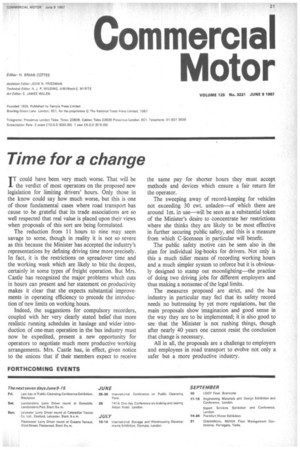Time for a change
Page 23

If you've noticed an error in this article please click here to report it so we can fix it.
IT could have been very much worse. That will be the verdict of most operators on the proposed new legislation for limiting drivers' hours. Only those in the know could say how much worse, but this is one of those fundamental cases where road transport has cause to be grateful that its trade associations are so well respected that real value is placed upon their views when proposals of this sort are being formulated.
The reduction from 11 hours to nine may seem savage to some, though in reality it is not so severe as this because the Minister has accepted the industry's representations by defining driving time more precisely. In fact, it is the restrictions on spreadover time and the working week which are likely to bite the deepest, certainly in some types of freight operation. But Mrs. Castle has recognized the major problems which cuts in hours can present and her statement on productivity makes it clear that she expects substantial improvements in operating efficiency to precede the introduction of new limits on working hours.
Indeed, the suggestions for compulsory recorders, coupled with her very clearly stated belief that more realistic running schedules in haulage and wider introduction of one-man operation in the bus industry must now be expedited, present a new opportunity for operators to negotiate much more productive working arrangements. Mrs. Castle has, in effect, given notice to the unions that if their members expect to receive the same pay for shorter hours they must accept methods and devices which ensure a fair return for the operator.
The sweeping away of record-keeping for vehicles not exceeding 30 cwt. unladen—of which there are around lm. in use—will be seen as a substantial token of the Minister's desire to concentrate her restrictions where she thinks they are likely to be most effective in further securing public safety, and this is a measure from which C-licensees in particular will benefit.
The public safety motive can be seen also in the plan for individual log-books for drivers. Not only is this a much tidier means of recording working hours and a much simpler system to enforce but it is obviously designed to stamp out moonlighting—the practice of doing two driving jobs for different employers and thus making a nonsense of the legal limits.
The measures proposed are strict, and the bus industry in particular may feel that its safety record needs no buttressing by yet more regulations, but the main proposals show imagination and good sense in the way they are to be implemented; it is also good to seeP that the Minister is not rushing things, though after nearly 40 years one cannot resist the conclusion that change is necessary.
All in all, the proposals are a challenge to employers and employees in road transport to evolve not only a safer but a more productive industry.




























































































































